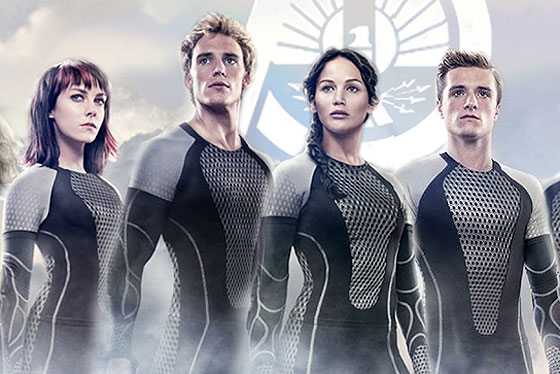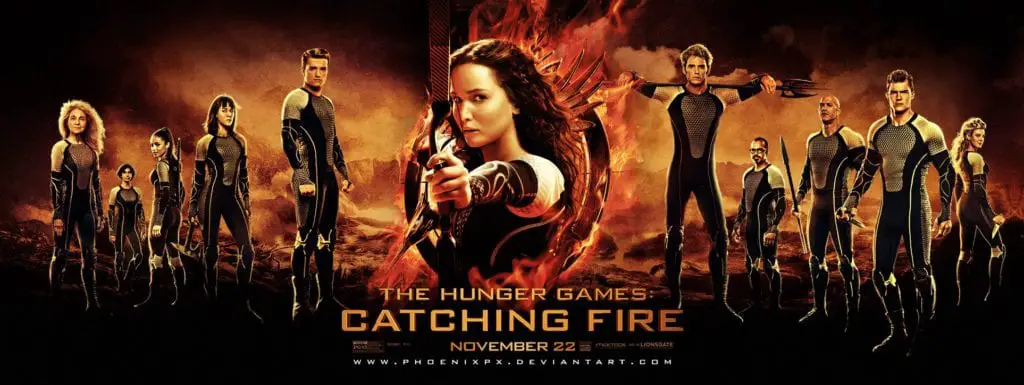Catching Fire by Suzanne Collins
The book picks up about 6 months after
the ending of The Hunger Games. Katniss and Peeta, now Vitctors, must
relive their time in the arena by doing a Victory tour of Panem. As a
reminder of the hunger games, the previous victor travels to each
district to celebrate their winning. Before going on this tour,
Katniss is confronted by President Snow. While Snow was mentioned in
the first book, this is the first time Katniss comes face-to-face
with the serpent-like leader of Panem. She describes him as smelling
like blood and roses, the latter attributed to the rose in his square
pocket. President Snow is a bigger presence instilling fear into
Katniss, which drives her decisions throughout the book. By bringing
these two characters to a head, the book gives the Capitol a face to
vilify.
 The book shows it's YA (Young Adult)
genre by having Katniss confused about her emotions and feelings for
both Gale and Peeta. But the book does a good job at not making “a
boy” the primary motivations for her decisions. She tells Gale that
she can't think about him (or Peeta) in a romantic way with
everything going on around her. Meanwhile, Peeta tries to deal with
his feelings for Katniss by being just friends, something that
ultimately endears him to her. The character of Gale is more present
in this book, showing the separation of friendship between two
characters that are grasping to maintain their old way of life. This
is where Gale starts to get more involved in standing up against the
Capitol, with a differing philosophy than Katniss, something that
slowly drives a wedge between the two.
The book shows it's YA (Young Adult)
genre by having Katniss confused about her emotions and feelings for
both Gale and Peeta. But the book does a good job at not making “a
boy” the primary motivations for her decisions. She tells Gale that
she can't think about him (or Peeta) in a romantic way with
everything going on around her. Meanwhile, Peeta tries to deal with
his feelings for Katniss by being just friends, something that
ultimately endears him to her. The character of Gale is more present
in this book, showing the separation of friendship between two
characters that are grasping to maintain their old way of life. This
is where Gale starts to get more involved in standing up against the
Capitol, with a differing philosophy than Katniss, something that
slowly drives a wedge between the two.
What Collins does in this book is
solidify Katniss' realization that she has changed everything and
there is no going back to her old life. After finding out that she
will be going back into the hunger games, she has to make a choice,
and that is to protect Peeta, at all costs. A sign that she really
does love and care for him. One of the standouts of this book are the
new characters that it introduces. We get a few characters that move
on to the next book, mainly Finnick Odair, Johanna Mason and Beetee.
Three past victors that ally with Katniss in the arena as part of the
rebellion. Finnick is one of my favorite characters from this trilogy
and he's introduced here as charismatic and beloved by the Capitol.
One thing I love about this book is
that it opens up the world of Panem to the reader, providing more
details about the districts and their victors. With the introduction
of the Quarter Quell, Collins gives details about the past Hunger
Games Quarter Quells, as well as some of the previous victors and how
they won their games. We learn that Haymitch is the victor of the 2nd
Quarter Quell, and we find out how he won the games and what he went
through. It provides some context into who Haymitch is as a person,
and why he drinks alcohol.
 The narrative structure doesn't flow as
well as the first book, due to inserting various scenes and
information about the other districts, the Capitol and past victors.
A lot of time is spent on expanding the world, which immerses the
reader, but sacrifices the flow of the story. There is also more time
spent in District 12 showing Katniss', Peeta and Haymitch's life
after the ending of the first book. While these details are great it
slows the pace of the story. The book also feels divided in two, with
the first half, taking place mostly in District 12 and the second
half in the arena. The story takes place over months which makes the
391 page book feel longer.
The narrative structure doesn't flow as
well as the first book, due to inserting various scenes and
information about the other districts, the Capitol and past victors.
A lot of time is spent on expanding the world, which immerses the
reader, but sacrifices the flow of the story. There is also more time
spent in District 12 showing Katniss', Peeta and Haymitch's life
after the ending of the first book. While these details are great it
slows the pace of the story. The book also feels divided in two, with
the first half, taking place mostly in District 12 and the second
half in the arena. The story takes place over months which makes the
391 page book feel longer.
When I first read The Hunger Games
trilogy, I loved Catching Fire and it was my favorite of the three.
Upon revisiting the trilogy, I have come to enjoy the simplistic
narrative structure of the first book more than the world building
done in the second book. While there is much to love about Catching
Fire, I think there are some extraneous details that are noticeable on
a second reading, especially knowing where Katniss' journey ends.

.jpg/220px-Catching_Fire_(Suzanne_Collins_novel_-_cover_art).jpg)


/arc-anglerfish-tgam-prod-tgam.s3.amazonaws.com/public/QDIXYY4625DQ5L4N5CSJG4RQME)
